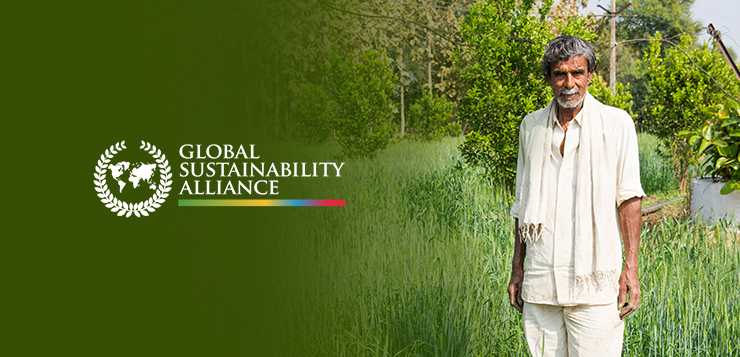
Today, when sustainability is becoming the cornerstone of international trade, the question is no longer if we must adapt but rather how fast we can do so. This urgency was at the heart of discussions during the Global Sustainability Alliance (GSA) summit in Gandhinagar, Gujarat, held on 30th August 2024. As delegates gathered to discuss the future of Indian farming, one message resonated loud and clear: without large-scale investments, Indian farmers risk being left behind in a rapidly evolving global market.
With the European Union (EU) tightening its sustainability regulations, Indian agriculture faces significant challenges. While India exported USD 1,725.34 million worth of agricultural goods to the EU in 2021-22, the road ahead is uncertain. Global markets are increasingly prioritising environmental responsibility, and the cost of falling short could be steep. To navigate these challenges, investments– particularly FDI– and government support are not just desirable, they are imperative.
India’s agricultural exports to the EU represent a significant portion of the nation’s economy. Coffee, oil cake, rice, tea and tobacco lead the list of exports, but as the EU enforces stricter sustainability standards, these industries face a daunting challenge. The EU’s new regulations, particularly the Carbon Border Adjustment Mechanism (CBAM), Environmental, Social, and Governance (ESG) standards and the Farm-to-Fork strategy, are fundamentally altering the landscape for exporters. The implications are profound, and for Indian farmers, this could mean increased costs, technological overhaul, and potentially losing their foothold in the European market.
The CBAM, a carbon tax on imports with high carbon footprints, is poised to impact agricultural exports directly. Many traditional farming practices, such as water-intensive cultivation and those associated with higher emissions, could become less competitive in the European market. As the EU pushes for carbon-neutral imports, Indian exporters may face higher tariffs unless significant investments are made to adopt sustainable practices. This shift could lead to increased costs for Indian farmers, who may struggle to compete with lower-emission alternatives in the European market unless they receive the necessary support for transitioning to environmentally friendly methods.
Meanwhile, the EU’s ESG standards introduce a layer of complexity that extends beyond environmental considerations. These regulations require Indian exporters to demonstrate responsible farming practices, ethical labour use and transparency across their operations. While this could lead to long-term benefits in terms of sustainability, the immediate financial burden of compliance may be too high for smallholder farmers without proper support.
The Farm-to-Fork strategy aimed at promoting sustainable food systems further increases these challenges. By pushing for reduced pesticide use, increased organic farming and greater biodiversity, the strategy demands significant changes to Indian farming practices. While organic farming offers a potential solution, the transition can be slow and costly, involving changes in soil management, pest control and crop rotation practices. Further, achieving organic certification is often a lengthy process that requires both time and financial investment, making it difficult for small farmers to compete in the short term.
Additionally, the Farm-to-Fork strategy calls for preserving natural habitats and maintaining diverse ecosystems on farms. This presents a specific challenge for Indian agriculture, where monoculture farming– inherited from the Green Revolution– is common, particularly in regions where farmers rely on rice or wheat as their primary crops. Diversifying crops to improve biodiversity may be essential to comply with these standards, but it could disrupt traditional farming models and impose additional costs on farmers who are already operating on tight margins.
The discussion at the GSA summit made it clear that without significant investments in infrastructure, technology and innovation, Indian farmers will struggle to meet these stringent standards. Without necessary improvements, farmers may find themselves priced out of the EU market due to the rising cost of compliance with sustainability standards.
While the summit rightly emphasised the need for government action to attract investments and create an investment-friendly environment for the farmers, these measures must go further. RAS Patel, Deputy Commissioner of the Department of Agriculture and Farmers Welfare, highlighted this during the summit, stating, “We have support from the Government of India, but getting investments from private sectors and FDI are also crucial. Investment is not just an economic necessity but a strategic imperative.” The focus on foreign direct investment (FDI) and private sector involvement is critical, but this alone cannot address the full scope of the challenges. Government action must extend beyond creating investment opportunities. The state must implement clear and supportive policies that guide farmers through this complex transition. For instance, providing access to modern farming technologies, creating incentives for sustainable practices and offering financial support for small farmers will be key to ensuring compliance with international standards. Moreover, the government needs to streamline regulatory frameworks that encourage both domestic and foreign investments while ensuring that the benefits reach farmers on the ground.
The absence of a coordinated strategy, particularly in addressing export policies and sustainability requirements for key agriculture commodities, reveals a gap in planning. For Indian agriculture to thrive in global markets, the government must take a more proactive role in creating comprehensive policies that not only attract investments but also ensure that investments translate into tangible, sustainable growth for the farming sector.
